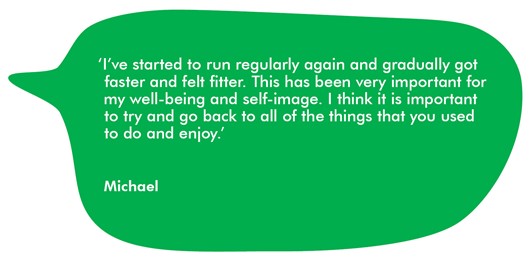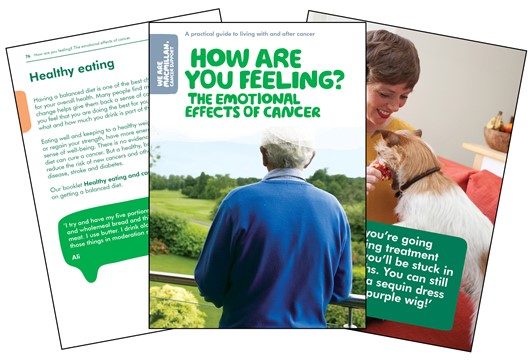This week is Mental Health Awareness Week (8th–14th May), hosted by the Mental Health Foundation. The week aims to increase awareness and educate people about mental illness. This year’s theme is Surviving, not thriving – a look at why so few people are thriving with good mental health. One of the aims of the campaign is to look at what we can do to look after our mental health. Editorial Assistant Amy-Louise has compiled some tips for positive steps you can take to help yourself.
If you have cancer, it is common to experience a range of different emotions and feelings. It can be tempting to ignore these or to try and put them to one side. But your mental health is just as important as your physical health, and there are things that you can do that may help you to cope.
Here are some practical tips for positive steps that you can take to help yourself:
Talking to someone
Talking to someone about how you feel might not be easy. But bottling up your feelings can make them more difficult to deal with. You might want to talk to someone you know well, such as a relative, friend or someone at work. Or, you may decide to get support from a healthcare professional, such as a counsellor or a psychologist. Your GP may be able to refer you for this.
Support groups can also give you the chance to talk to others in a similar situation to you, while sharing experiences and supporting others. The Macmillan Support Line is also there to listen if you need someone to talk to, and can also give you financial and medical advice. You can call them on 0808 808 00 00 (Mon-Fri, 9am-8pm). For support at any time of day you could also visit Macmillan’s online community, which lets you talk to people in chat rooms, blog your experiences and make friends.
Writing things down
If you’re finding it difficult to talk, it might be helpful to write down how you feel. You can use this as a starting point for conversation. You could write a diary, journal or an online blog. It might help to use one of the thinking tools on the Think About Your Life website if you are not sure where to start.
Being physically active
Being physically active before, during and after treatment for cancer can help to improve your quality of life, reduce anxiety and depression, and help you to feel better about yourself. Physical activity can include simple daily activities such as walking to the shops, or more energetic activities such as running or cycling. Our guide Move more: your guide to becoming more active can help you get started.

Doing things that you enjoy
You may feel like you can’t make time for yourself when you are feeling down. But this doesn’t have to be the case. Try setting aside some time each day to dedicate to something that you enjoy. This could be a hobby, such as drawing or reading. It could also be watching a favourite TV programme, doing a puzzle, or gardening. Staying in contact with friends or relatives and finding time to see them can also help to lift your mood and help you to feel less alone.
Eating well
Having a balanced diet is one of the best choices you can make for both your physical and mental health. Eating well and keeping to a healthy weight will help you maintain or regain your strength, have more energy, and feel more positive about yourself. Our booklet Healthy eating and cancer has more information about eating a healthy diet.
If you want to find out more about how to look after your mental health when you have cancer, our booklet How are you feeling? The emotional effects of cancer could help. To order a printed booklet, pdf or eBook, visit be.macmillan.org.uk. Or there is more information on our website.

The Mental Health Foundation also has information on how to look after your mental health.
To see what else Macmillan's cancer information team has been blogging about, please visit our blog home page! You can subscribe to receive our blogs by email or RSS too.
We're with you every step of the way
The Macmillan team is here to help. Our cancer support specialists can answer your questions, offer support, or simply listen if you need a chat. Call us free on 0808 808 00 00.
Comments? Feel free to add them below (you need to be logged in).
Keep in touch Follow Macmillan’s cancer information team on Twitter @mac_cancerinfo
Whatever cancer throws your way, we’re right there with you.
We’re here to provide physical, financial and emotional support.
© Macmillan Cancer Support 2024 © Macmillan Cancer Support, registered charity in England and Wales (261017), Scotland (SC039907) and the Isle of Man (604). Also operating in Northern Ireland. A company limited by guarantee, registered in England and Wales company number 2400969. Isle of Man company number 4694F. Registered office: 89 Albert Embankment, London SE1 7UQ. VAT no: 668265007